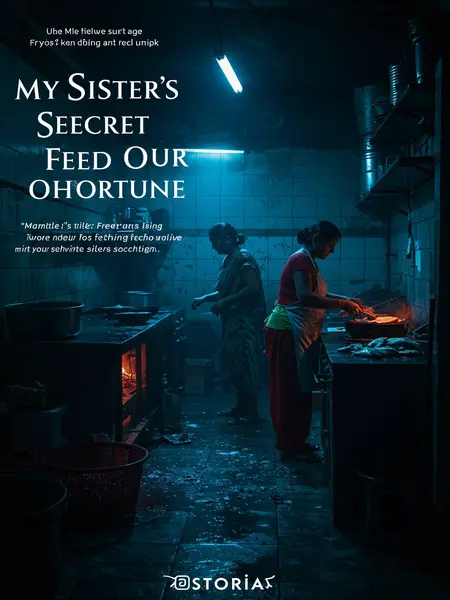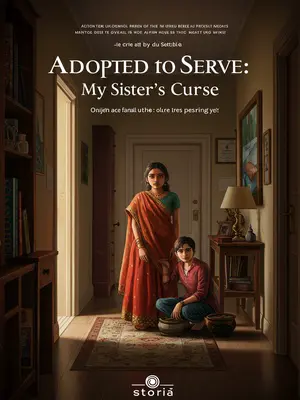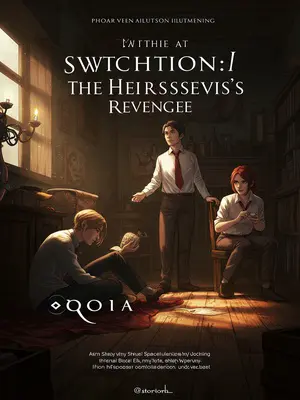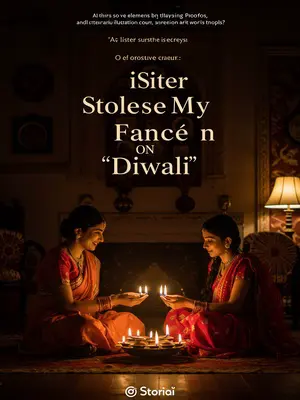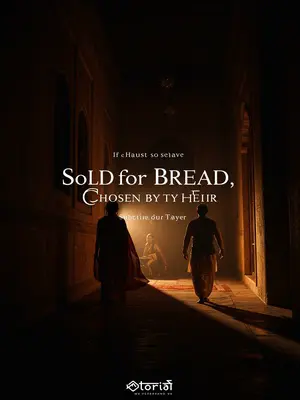Chapter 1: Pomfret Days and Family Arrivals
Dad’s seafood stall is famous all over the area, especially for the wild pomfret he claims is specially reserved for men—it’s always in short supply. On weekends, the galli outside fills with the honking of autos and the clang of steel plates, while the scent of fried fish mixes with incense from the nearby temple.
Even the auto-wallahs from the next mohalla gossip about it, and the local police inspector sometimes comes in plainclothes for a plate, his moustache twitching as he tries not to be recognized. Dad always gives him an extra helping of chutney, as if that's the real secret. He winks at customers and says, “This pomfret is for asli mard, baba. Not for everyone.” Sometimes I’d see regulars whispering as they left, as if they’d just witnessed some miracle. At night, when the shutters come down, even the stray dogs sniff the air hopefully, as if trying their luck.
People who’ve tasted it say the pomfret is firm and flaky, and just one bite makes them feel as if they’ve entered some dreamland.
Some claim it's got magic in it, as if Ma Saraswati herself blessed Dad's hands. I remember one uncle with a big paunch swearing that after eating it, he could run a marathon or at least chase after the local cricket ball with his grandchildren. Aunties joke that their husbands come home smiling after pomfret days, and the colony kids imitate the fish dance, shaking their heads and pretending to float away. The aroma itself lingers in the galli until late at night.
Because of this, people don’t mind spending a lot just to try it once.
It’s become one of those things—like buying a new car, or going on a Goa trip—people brag about it at weddings, and the WhatsApp family group is full of ‘selfie with pomfret’ photos. My friend Manish, who usually counts every rupee, paid without bargaining, then told everyone back home, "Arrey bhai, paisa vasool, yaar."
But I’ve noticed that every time Dad opens the pomfret stall, my sister suddenly falls ill, curling up in bed with a flushed face. She clutches her stomach, murmuring that the heat is too much, though the ceiling fan whirs above her on full speed.
No one talks about it openly, but Ma starts making haldi doodh quietly, and Dad brings her a hot water bottle. My sister, Rupa, closes the curtains, refusing to eat anything, always blaming the heat. But summer or winter, it’s the same. I’ve even heard neighbours whispering, “Is Rupa all right? Bichari, such a sweet girl.” I started keeping an eye on the calendar, too, noting the strange coincidence.
In my final year of college, my parents—who had always farmed back in our village—suddenly decided to move to the city, saying they wanted to find work.
I was shocked, honestly. Our family had never even left the district for generations—except me, for my studies. Baba and Ma could barely speak Hindi without mixing in our dialect. When I called home to wish for Sankranti, they told me, as if it was the most normal thing, that they were coming to Pune. I felt both excited and uneasy.
Before I could even ask why, they’d already brought my sister along, and the three of them showed up before me, driving our battered old Mahindra pickup that we used to haul grain.
The sight of that familiar, dented green pickup outside my hostel—covered with red mud and with bundles tied on the roof—made me laugh and cry at the same time. My hostel mates gathered around, helping unload sacks of rice, a crate of mangoes from our own tree, and Rupa’s favourite steel tiffin. Someone whistled at the sight of the mud-splattered Mahindra, while a neighbour aunty peered from her balcony, already curious about the newcomers. Baba looked proud as if he was bringing treasure from the village.
They said they wanted to open a seafood restaurant near my college in Pune.
I was so taken aback that I almost dropped the lunchbox Ma pressed into my hand. “Seafood? Us? But…”
As soon as I heard this, I quickly shook my head and tried to talk them out of it:
“Our family lives deep in the ghats—we’ve barely even seen seafood in our lives. How would you know how to prepare it?”
I remembered the times we used to go to the local haat, bargaining for a small rohu fish from the river. Salted fish was a luxury, and prawns were something I only saw on TV. I couldn’t imagine my parents running a seafood joint.
Dad glared at me, eyes wide: “What do you know, beta? Your dad can get things no one else can. People will be lining up to get a taste.”
He gave me that look—the one that said, ‘don’t argue with your elders.’ Ma clicked her tongue, as if I’d insulted some ancient family tradition. Rupa just looked away, twisting the edge of her dupatta, eyes shining with something I couldn’t read.
I was speechless: “You just got here—where are you going to find good seafood? There are only a few reputable suppliers.”
Honestly, I worried about scams—Pune is full of people ready to trick villagers. I imagined Dad coming home with frozen basa fish and passing it off as wild pomfret, and felt embarrassed for all of us. I tried to imagine my friends lining up to eat, and failed.
“All right, enough. You’ll understand in time.”
Dad put on a mysterious face, insisting on finding a shop to rent right away and wanting to open for business as soon as possible. He thumped his palm on the counter, eyes shining with stubborn pride, the way he used to argue with the mandi broker back home.
He began asking around the local chai tapri, bargaining hard for a shop at the edge of the market. Even the broker, Javed Bhai, said, “Uncle, at least see the place twice before paying advance!” But Dad wouldn’t listen. Ma quietly drew a swastik with kumkum on the shutter the day they took possession.
I tried several times to talk them out of it, but the seafood restaurant still opened.
All my warnings fell on deaf ears. Even Rupa, who usually sided with me, was silent. I felt helpless, and a little left out. Dad called it “Rupa’s Fish House”—painted with bright blue letters and a pomfret cartoon that looked suspiciously like Rupa herself.
What I didn’t expect was that the seafood restaurant I’d doubted actually opened—and not only did it not close down quickly, it became more and more popular, with crowds lining up at the door.
Within a month, word spread faster than monsoon gossip. Local shopkeepers complained that our customers blocked the footpath. The mithaiwala next door grumbled, “All my rasgullas smell of fish now!”
My dad, who had never even seen the sea, somehow looked completely at ease preparing seafood.
He moved like he’d been cleaning pomfret his whole life, slapping the fish on the counter, gutting and marinating it, then wrapping it in banana leaves with his own masala. Even the fishermen’s union head nodded with respect. Dad claimed his masala recipe came from our ancestors, but Ma just smiled and said nothing.
Especially the restaurant’s signature dish: steamed pomfret. It became a local sensation.
The dish had its own legend. Customers whispered about the “miracle fish.” Even food vloggers with fancy DSLRs started turning up. Dad would serve the pomfret with a flourish, drizzling lemon over it and saying, “Only for men, bhai. Ladies, wait your turn in the next life!” The waiters joked that even the bones tasted sweet.
The flavour was so extraordinary that customers from other states would willingly drive over ten hours just for a taste.
One NRI uncle came all the way from Dubai and said, “In my whole life, I’ve never eaten fish like this—even in Bandra!” Dad just folded his arms and grinned, loving every minute. The shop got written up in some local foodie blog, and the next day, a film producer’s assistant called to book a table.
But Dad’s pomfret wasn’t something you could have anytime. First, it was only served to men—women weren’t allowed to eat it at all. Second, it wasn’t available every day; only on the first and fifteenth of each month, and even then, only in limited quantities.
Posters went up in the lane: “Special Pomfret—Men Only. 1st & 15th. Book Fast!” Ma would quietly put up a board, “Today’s pomfret: sold out,” and people still begged for a single piece. The WhatsApp group was full of men trying to book through ‘contacts’. Aunties started wondering aloud, “What’s wrong with us? We also want to taste!” but Dad just laughed and said, “Rules are rules.”
When I figured out Dad’s pomfret supply rules, I was surprised:
“Dad, you may not have much schooling, but you’re great at this scarcity marketing thing. Limited-time, limited-quantity pomfret really makes people want it more.”
I said it jokingly, but inside I was honestly impressed. Scarcity is the oldest trick in the book, but it was working better than any MBA strategy. My friends kept asking for ‘staff discount’ and I had to refuse.
Dad shot my sister a fierce glare: “I don’t know anything about marketing. It’s just that your sister isn’t capable—she can only produce so much.”
He spoke as if Rupa was some ancient well that might dry up if used too much. The way he looked at her made me uneasy. Ma pressed her lips together, not saying a word. Rupa’s face turned red, and she looked at the floor.
I looked at my sister, puzzled.
Her face was red with embarrassment, one hand pressed gently to her lower abdomen, and she pleaded, “Dad, I really can’t take it if it’s too much. Can’t we sell a little less?” Her eyes darted to Ma, silently pleading, but Ma only smoothed Rupa’s hair and whispered a prayer.
Her voice was so low, I barely caught the words. Ma reached out, touching Rupa’s forehead, murmuring something under her breath. The whole thing felt more like a temple ritual than a business discussion.
I stared at my sister in confusion. Ever since we moved to the city, she’d been acting strangely.
She, who used to joke and gossip with me, had become withdrawn. I’d find her lost in thought, staring out the window at the traffic. Sometimes I caught a whiff of something strange—a briny, fishy scent, like the sea itself had moved into our rented flat. I wondered if it was just my imagination.
Not only was she often absent-minded, but sometimes her body gave off a fishy smell.
One evening, I saw her come out of the bathroom, hair still wet, skin shining as if she’d been sweating buckets. She barely touched her dinner, just played with her rice and left early. Ma would bring her lime pickle and force her to eat a spoonful, whispering, “Bas beta, eat a little, for your health.”
“There’s no room for discussion. If you produce less, how much money will I lose? I raised you with so much effort—don’t be ungrateful and forget to pay it back.”
Dad’s voice was harsh—too harsh. The neighbours probably heard him, but no one said anything. Rupa’s eyes filled with tears, and Ma turned away, hiding her face in her sari pallu. I felt something cold crawl up my spine, hearing the word ‘pay back’ used like that.
Seeing Dad’s firm attitude, my sister didn’t dare argue. She covered her face and ran out, crying.
Her dupatta slipped off her shoulder as she went, and for a second I saw red welts on her arm. Ma hurried after her, calling softly, but Rupa slammed the door to the bedroom. The clatter echoed down the corridor, and even Dad looked away, his jaw tight.
“Dad, what’s really going on?”
I tried to keep my tone calm, but my voice cracked. The fishy smell from the kitchen was suddenly nauseating. Dad just kept cleaning his knife, not meeting my eyes.
“You’ll understand when you get married.” Dad’s eyes flickered, refusing to meet my gaze.
He wiped his hands on his lungi, then looked outside at the road as if he was waiting for someone. Ma came back, eyes red, pretending to check the gas. I suddenly felt like a child again, out of depth.
But clearly, my sister isn’t married either—so how does she know?
I wanted to shout, but my tongue felt stuck. Rupa was unmarried, just a year older than me, yet she and Ma shared silent glances that shut me out. Was there a rulebook for daughters that no one gave to sons?
Seeing his reaction, my curiosity only grew.
I started noticing every detail—how Rupa never came out on pomfret days, how Ma would buy special puja flowers the day before, and Dad would avoid eye contact with everyone. I decided enough was enough.
To get to the bottom of it, I volunteered to help out at the shop, since I had few classes left in my final year.
I told them I could handle accounts, or at least take orders. Dad grunted, but didn’t say no. Ma looked relieved. Rupa didn’t say anything, just nodded and left for her room.
My parents readily agreed—business was booming, and just the three of them were run off their feet.
The shop had grown so popular that even local politicians sent their men for takeaway. Dad refused to hire anyone, mumbling about ‘family business’ and ‘secrets staying in the family.’ I noticed Ma started wearing more gold, her old mangalsutra replaced with a heavier one.
They also refused to hire any help, so only the three of them worked, busy from dawn till night.
Neighbours joked that our flat always smelled of fish and money. Rupa started sleeping through the afternoons, her room always locked. The fridge overflowed with tiffins and packets, but no one else touched the pomfret stock except family.
